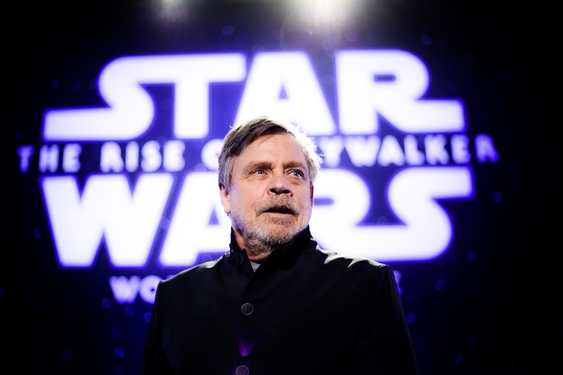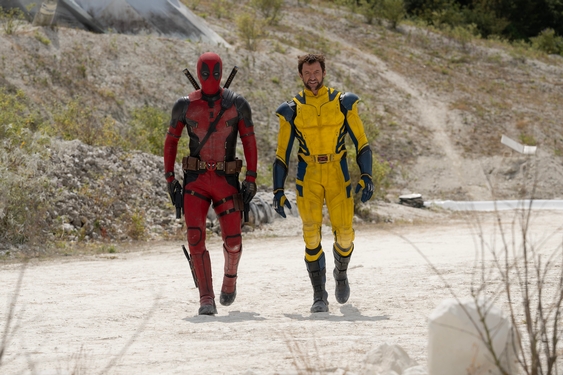Meredith Blake, Greg Braxton, Matt Brennan, Tracy Brown, Maira Garcia and Robert Lloyd - Los Angeles Times (TNS)
Every two years, athletes from around the globe gather to compete at the Olympic Games. And every two years, stories emerge that capture the world’s attention, from the tragic to the triumphant.
With the Summer Olympics set to begin in Paris on Friday, key storylines are already emerging.
There is Simone Biles’ much-anticipated return to Olympic gymnastics three years after she withdrew from the Tokyo Games. There is the question of how the wars in Ukraine and Gaza might disrupt the facade of international unity. There’s even concern about pollution in the River Seine, which may be too full of sewage to provide a safe venue for long-distance swimming events — though the Paris mayor took a dip recently to prove it was safe.
Whatever the Big Narrative of 2024 turns out to be, it will likely get the documentary treatment at some point in the future. The human drama of the Olympics — from the athletes who participate in them to the controversies that sometimes overshadow the competition — have been fodder for nonfiction filmmakers since at least 1912.
To help you get ready for the games, The Times TV team has compiled a list of Olympic-themed documentaries available to stream, including moving tales of human triumph and infuriating accounts of systemic corruption, and cautionary tales of nationalistic myth-making.
‘Simone Biles Rising’
When Simone Biles withdrew from the Tokyo Games three years ago, citing a mental block known as “the twisties” that made it difficult for her to control her body in the air, it wasn’t clear whether the celebrated gymnast, then 24, would ever return to Olympic competition. Now 27, in a sport long dominated by teenage girls, she is poised to make a historic comeback at the Paris Games. The first two episodes of this four-part Netflix documentary, directed by Katie Walsh, follow Biles as she returns to the gym and gradually regains her bearings — with support from her husband, NFL player Jonathan Owens, family and teammates. The documentary looks at the connections between Biles’ psychological struggles and the sexual abuse and racism that she endured, and retraces the brutal history of a sport that can be as toxic as it is dazzling. Funny and thoughtful, Biles comes across as a relatable young woman who happens to be able to perform superhuman feats. Two additional episodes, coming this fall, will follow Biles in Paris. The end of Biles’ story has yet to be written, but whether she wins or loses at the games, she makes for a compelling subject. (Stream on Netflix.) — Meredith Blake
‘Fists of Freedom: The Story of the ’68 Olympic Games’
The focus of this HBO documentary is on one of those electric — and controversial — moments in Olympic history. Sprinters Tommie Smith and John Carlos staged a silent salute to Black Power by raising their Black-gloved fists on the victory stand. The athletes’ protest for social justice resulted in an iconic picture and sparked both positive and negative reaction while bringing the racial tension of American politics onto the international stage. The 1999 Peabody Award winner explores the fiery moment, and how it affected the careers of Smith and Carlos. (Stream on Max. )— Greg Braxton
‘Visions of Eight’
This 1973 anthology film of the 1972 Munich Summer Game set an international group of directors, including Arthur Penn, Miloš Forman, John Schlesinger, Mai Zetterling and Kon Ichikawa, loose on the Olympics, each assigning themselves a subject and working with their own crews. This is less a traditional documentary than a collection of non-narrative tone poems, which abstract the spirit of the games rather than charting any individual story. Some focus on an individual sport, others explore a larger idea, as in Michael Pfleghar’s “The Women”; Yuri Ozerov’s “The Beginning,” which looks at athletes in the moments before they compete; and Claude Lelouch’s “The Losers,” which captures them in the immediate aftermath of their failure. For his segment on the men’s 100-meter finals, a race lasting “about 10 seconds,” Ichikawa employed 34 cameras and 20,000 feet of film. Forman’s comical look at the decathlon is scored with bell ringers and yodelers, while Schlesinger’s intense “The Longest” intermixes the marathon with the attack by Palestinian terrorists on the Israeli quarters in the Olympic Village. It streams as part of Criterion’s 53-film “100 Years of Olympic Films, 1912-2012,” which also includes Ichikawa’s great 1965 “Tokyo Olympiad.” (Stream on the Criterion Channel.)— Robert Lloyd
‘Olympia’
Leni Riefenstahl’s two-part documentary, chronicling the final games held before World War II, is a potent reminder of the power of the Olympic Movement— to whitewash human rights abuses, glamorize repressive regimes, soften dictators’ personas and generally use the International Olympic Committee’s stated mission of promoting “ethics and good governance in sport” to cover up their absence anywhere and everywhere else. After all, with its idolization of the athlete and its paean to the nobility of competition, the German filmmaker‘s kinesthetic epic of the 1936 Berlin Olympics, with its pioneering images of divers breaking the water and runners breaking the tape, can seem pleasantly distant from the circumstances of its making; who wouldn’t wish, in a world marked by economic desperation, social dislocation, technological revolution and authoritarian politics, to keep one’s eyes squarely on the court, ring or field? And yet to do so, as “Olympia” teaches us, is to risk overlooking the shadow of evil, Hitler’s or otherwise, hovering over the stands. Spectacle, the klieg light of the powerful since before even the ancient Olympics, is still more than capable of blinding us to the dark. (Stream on the Criterion Channel and YouTube.) — Matt Brennan
‘Icarus’
This 2017 Oscar winning documentary begins with one objective: Can filmmaker Bryan Fogel improve his performance in an amateur cycling race through the use of performance-enhancing drugs without it being detected? The point isn’t for him to win the race; it was to show how testing for PEDs remained inadequate, years after professional cycling was rocked by Lance Armstrong’s doping case. It leads Fogel to connect with Grigory Rodchenkov, a Russian scientist and then-director of Moscow’s anti-doping laboratory, who creates a doping regimen for him, becoming friends in the process. In the months that follow, Rodchenkov moves to the center of the story as Russia’s state-sponsored doping program is uncovered and he provides incriminating evidence of the government’s involvement to the New York Times, the World Anti-Doping Agency and the IOC. It’s a roller coaster of a film that led to Russia’s ban from Olympic competition and Rodchenkov being placed in witness protection. (Stream on Netflix.) — Maira Garcia
‘Dream On’
The U.S. women’s national basketball team will be competing for a record eighth consecutive Olympic gold medal in Paris. This three-part “30 for 30” doc, released in 2022, tells the story of the team that started that streak at the 1996 Atlanta games and whose success directly led to the formation of the WNBA. And it wasn’t as easy as that team’s 8-0 Olympic record might have you believe. “Dream On” chronicles how lackluster results at back-to-back major international competitions (bronze at the 1992 Barcelona Games and at the 1994 world championship) led to USA Basketball trying something different. With support from the NBA, which was interested in testing the waters for a potential women’s pro league, the organization assembled a women’s version of the Dream Team that trained and competed together for a grueling 14 months leading up to the 1996 games. The doc sheds light on the players’ experiences, personal hardships and more on their road to gold. With the WNBA’s surge in viewership and popularity this season, this is a great look at those who paved the way. (Stream on ESPN+.)— Tracy Brown
‘One Day in September’
This Oscar winning documentary was released a quarter century ago but remains tragically relevant. Directed by Kevin Macdonald, “ One Day in September” looks at the events of Sept. 5 and 6, 1972, when eight members of the terrorist group Black September took a group of Israeli athletes and coaches hostage at the Munich Olympic Games. Twenty-four hours later, 11 Israelis were dead along with a German police officer and five of the Palestinian attackers — an event that marked a bloody inflection point not only in the history of the Olympic Games but also the Israeli-Palestinian conflict, which continues to rage on decades later. With the brisk pace of a thriller, the film looks at how West German officials who had hoped to recast their country’s image at a time when the horrors of World War II remained vivid in the public imagination, instead bungled their response to the attacks — with tragic results. The documentary features extensive interviews with surviving family members and German officials, as well as Jamal al-Gashey, the last surviving member of the Black September group, who appears in shadow. (Stream on ScreenPix via YouTube.)— Meredith Blake
‘The Price of Gold’
There are few Olympic sagas more sordid — or more engrossing — than that of Nancy Kerrigan and Tonya Harding, the American figure skaters whose rivalry erupted into one of the most notorious tabloid scandals of the 1990s. Directed by Nanette Burstein, this “30 for 30” film revisits the ordeal that began in January 1994 when Kerrigan was clubbed on the knee just weeks before the Lillehammer games. As the world soon learned, the attack was orchestrated by Harding’s husband, Jeff Gillooly, in a bid to elevate his wife’s Olympic prospects — and financial potential. “The Price of Gold” shrewdly explores how class, gender and body image played out in the Nancy versus Tonya narrative and how Harding, a powerful athlete from a blue-collar background, was often penalized for her aesthetic choices. Kerrigan did not participate in the documentary, which was released in 2014, but Harding did, and she comes across as sympathetic but also maddeningly evasive and defensive. A few years later “I, Tonya” would explore Harding’s story again, but with much less subtlety. (Stream on ESPN+.)— Meredith Blake
©2024 Los Angeles Times. Visit at latimes.com. Distributed by Tribune Content Agency, LLC.





